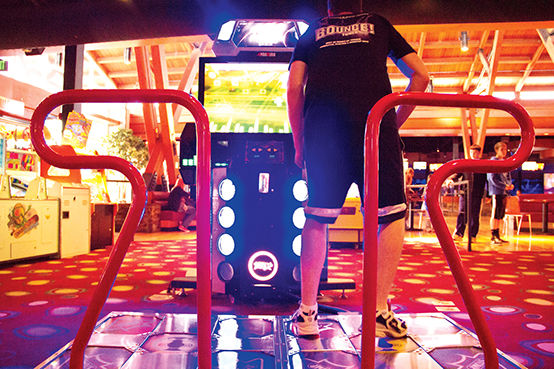Story by Nicole Ginley-Hidinger
Photos by Kathryn Boyd-Batstone
In Country Bakery, the scent of baked goods drifts out of the kitchen where all sorts of treats—cookies, pies, cinnamon rolls, bread—line the shelves. Located in a plain white house in Halsey, Oregon, the bakery is surrounded by farms. Across from the kitchen, there is a gift shop offering pictures, potholders, and other handmade goods. Above the counter, a blue bumper sticker hangs on a dry-erase board: “Jesus Christ, Hope of the World.”
At the cash register stands bakery owner Loretta Birky, who also lives in the house. Dressed in a long-sleeved, light blue dress with a knit white hat covering the back of her head, Birky greets every visitor with a smile. In between taking pies out of the oven and restocking the shelves, Birky chats with her customers. They talk about each other’s families, careers, and faiths. For Birky, who is a Mennonite, religion greatly influences her work in the bakery. The bumper sticker hanging over the counter represents Birky’s faith in her religion, but it is her baking that Birky says truly shows her devotion to God.
She believes in living simply, a philosophy common to her fellow Mennonites. Rose Marie Barber, Birky’s pastor at Eugene Mennonite Church, says in her congregation, “You find a lot of service, a lot more thinking that we are here for other people and not necessarily for ourselves.” Birky applies that principle to her job as a baker. “I am a believer in the Lord and the baking is a way to talk about my faith and who Jesus is,” she says.
Country Bakery opened 18 years ago as a hobby for Birky, who previously taught school. Now full time at the bakery, she makes pies, cakes, and cookies all week and then wakes up long before the sun rises on the two days the bakery opens (Friday and Saturday) to prepare the doughnuts and other small goods that run out quickly.
On those days, Birky’s home transforms into a bakery. She stocks the racks, bags the cookies, and lines up the loaves of bread in preparation for the continuous stream of customers. On some days, an entire local sports team might pop by. One weekend, more than a hundred motorcycle bikers stopped in for a mid-ride snack.
“I’ve always wanted to work out of my home,” Birky says. “I got tired of going away to open those school doors and cold buildings.”
Now, Birky spends her time in a house constantly heated by the standard oven she uses to make all the bakery’s treats. Apart from a sign on her road, Birky doesn’t advertise Country Bakery. “I’m not a very good businesswoman as far as going out and pushing my product,” she says. Instead, news of the bakery spreads by word of mouth and with the help of a few articles published in local newspapers.
“I think if people come taste the food then they’ll know if they want it again,” Birky says. “They’ll come back and tell others, and that works pretty good.”
Birky gets her recipes from a variety of places, including the Betty Crocker Cookbook and The Miller Cookbook, sold in Country Bakery’s gift store and authored by her aunt and sister. “If it works for me I use it,” she says of her recipe choices.
Back in the warmth of the bakery, a customer asks if any Mennonite doughnuts are available. Unfortunately, Birky says, the doughnuts sold out earlier in the morning. The doughnuts aren’t actually “Mennonite.” “It’s not Mennonite food, but I know what they mean,” Birky explains.
Irene Walen, one of Birky’s regulars, drives up from her home in Eugene to buy Country Bakery goods as often as she can. This weekend, she brought a friend to show her how good Birky’s baking is. “Whenever I have company I stock up on her baking,” Walen says.
Knowing the food and the merchandise are made by Mennonites comforts Walen. “Some really nice people have made these gifts. It just kind of makes you feel old-fashioned.”
Birky is passionate about her religion; she is more than willing to talk about being a Mennonite with any customer that stops in. A Christian sect, Mennonites (named after Anabaptist religious leader Menno Simons) practice “believer’s baptism,” or baptizing adults instead of infants.
“[Early Mennonites] decided you should make your own choice to decide if you were going to follow Jesus,” says Pastor Barber, who’s dressed in a simple long-sleeved shirt with a scarf. Her casual outfit differs from Birky’s traditional clothing; Birky sews all her own clothes from a specific pattern commonly used by Mennonites that includes a two-layered front covering the chest and a collar. Unlike Barber, Birky also wears a head covering. “It’s a symbol to the people around us that we are following the word of God,” Birky says. “It shows our submission to man and that God has a plan for people.” When Birky first met Barber she was surprised at her pastor’s more casual attire. “She said, ‘You’re the pastor?” recalls Barber.
“Each Mennonite leader decides what the group’s non-conformity looks like,” she adds. “The emphasis is on community.”
Birky’s Country Bakery brings her community together; people travel from far outside rural Halsey to visit. As soon as customers enter the bakery, they’ll see a tapestry hung on a wall near the kitchen. It reads: “As for me and my house, we will serve the Lord.” That, Birky says, is what she tries to do every day: “Baking is something I can do and I don’t feel out of God’s will doing it.”
Categories:
Faith from Scratch
June 4, 2012

0








